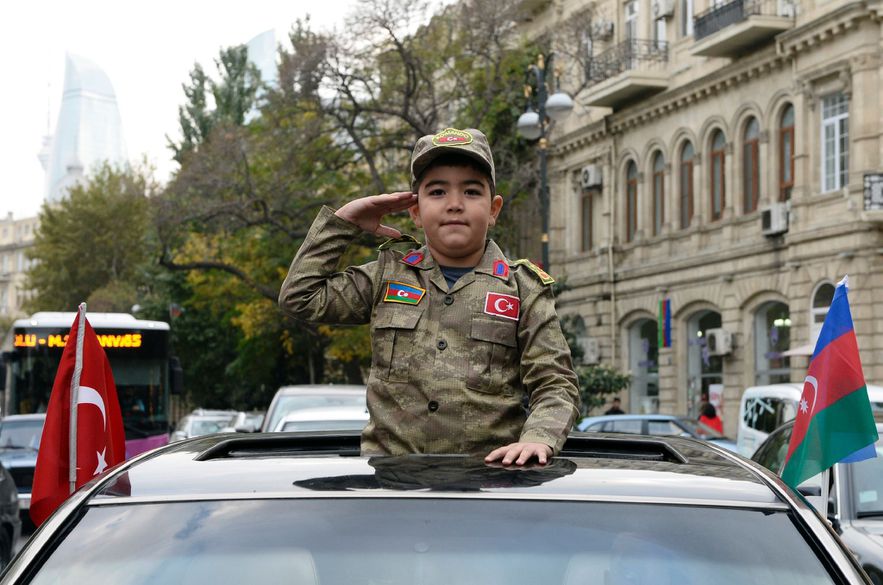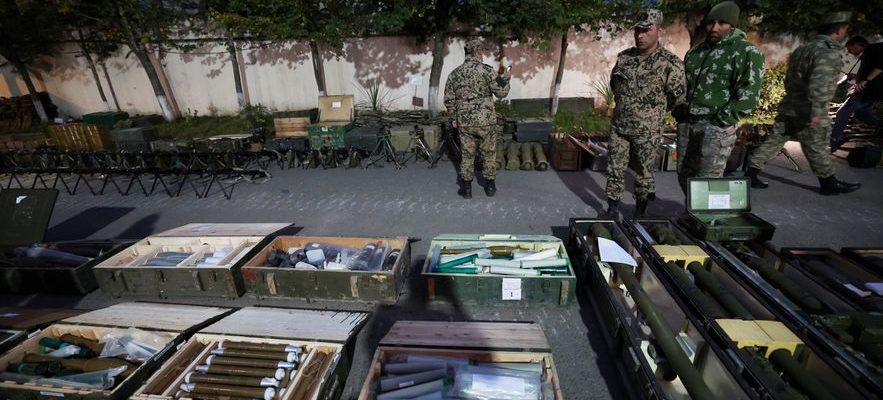The resistance was short-lived. After barely 24 hours of the Azerbaijani army’s offensive, the forces of Nagorno-Karabakh were forced to accept a ceasefire paving the way for the full integration of their territory into Azerbaijan. The greatest uncertainty now reigns over the fate reserved for the local populations, subject to the goodwill of Baku, despite talks with the local authorities. Former defense attaché near Georgia, Armenia and Azerbaijan, Jean-Luc Théus, a fine connoisseur of the military context of the Caucasus, returns to the military roots of this second Armenian rout, after that of 2020, recalling that the “Karabakh was under blockade” for several months.
L’Express: Was this capitulation of the Karabakh forces inevitable?
Jean-Luc Théus: Yes, it was inevitable, because the Karabakh forces are not the best equipped of the entire Armenian-Karabakh Alliance. They had been seriously damaged in terms of equipment and psychologically during the 2020 war. This army was all the more weakened as the territorial and logistical link with the Armenians, the Lachin corridor, was under Azerbaijani control. The latter used different pretexts to tighten the noose. Karabakh was under blockade.
However, the Russian army had observer posts in Karabakh, supposed to guarantee peace. But she didn’t do anything.
The passivity of the Russian “peacekeeping” forces can be explained by different reasons which are not mutually exclusive. Firstly, there is a political will from Moscow to occupy the ground with its own troops to prevent other interposition forces from being present – in the past, the Azerbaijanis have sometimes mentioned the possibility of a force of interposition from the European Union. The 2020 ceasefire monitoring system dates from before the war in Ukraine and Russia undoubtedly thought it “held” the ground alone. Russian leaders know that their forces there (base “102” in Gyumri, Armenia, and detachment of the 15th Motorized Brigade on the Lachin corridor) do not have a very high operational capacity.
Was the Armenian army able to provide substantial aid to Karabakh against the Azeri army?
What has changed in the Armenian army since 2020? No doubt she learned the doctrinal and psychological lessons from what happened then, realizing that she had made bad choices, by not purchasing the right military equipment, by relying too much on Russian army, perhaps also by not training sufficiently with the Karabakh army. I don’t see how it could have radically changed and adapted to the Azerbaijani tool in three years to change the balance of power.
The Azerbaijani army displays weapons seized from separatist forces in Nagorno Karabakh, September 23, 2023 in Shusha, Azerbaijan.
© / afp.com/EMMANUEL DUNAND
What is this Azeri military superiority based on?
Thirty years ago, there was no such superiority, for reasons which also relate to the fact that the Armenians had a military culture perhaps more developed than that of Azerbaijan. The Azerbaijani army has methodically built a tool for reconquest, in terms of equipment, doctrine and moral force – they have thus developed a new fighting spirit within their armed forces and the population through an ultranationalist discourse. This is something that the Armenians did less, because they did not have the same financial resources.
I think Armenia also lied to itself about its ability to counter Azerbaijan through the system of alliances, thanks to the supposed unconditional support of the Russian army. She was also – especially diplomats – convinced that she was intrinsically superior to the Azerbaijanis. She also believed that her adversaries would never defeat her mountain warriors. The Armenian army saw itself as stronger than it was.
What about the equipment?
The Azerbaijanis have built a capacity to destroy Armenian anti-aircraft defenses. This tool, in Western armies, consists rather of precision missiles fired from aircraft. The Azerbaijanis have chosen drones. And for quite a long time: we saw the first Israeli drones during military parades in Baku in 2011, before the arrival of drones developed by Turkey, the country’s main ally.
The Armenian air defense system, which encompassed Karabakh, was not adapted to this threat of small lurking munitions and slow-flying drones, made of materials difficult to detect by the radars with which the Armenians were then equipped. The Azerbaijanis managed to integrate this small fleet of drones into a coherent doctrine which, coupled with the employment of long-range artillery, the bold use of special forces in mountainous terrain and electronic warfare assets, allowed in-depth destruction and the defeat of the Armenian adversary.

Boy in Azerbaijan army uniform during celebrations in Baku on November 10, 2020, after the agreement with Armenia ending fighting in Karabakh.
© / afp.com/Tofik BABAYEV
Karabakh seems on the way to returning completely to the Azerbaijani fold. Has the risk of war between Armenia and Azerbaijan been reduced?
Potentially yes, because Karabakh was the main bone of contention between Yerevan and Baku, as well as between Yerevan and Ankara. But we must also question Baku’s real war aims. And, also, how far Ankara is willing to go. Until obtaining territorial continuity between the Caspian Sea and Turkey via Nakhichevan, in the very south of Armenian territory? The times we live in accustom us to forceful solutions and Baku may want to create such a corridor, causing Armenia to lose the territorial link with its Iranian support. In Baku, the discourse regarding Armenia remains ambiguous and maintains questions about the existence of Armenia in its current geographical form.
There are a lot of uncertainties, all of which will largely be discussed in Ankara. The Turks, in their desire to influence the region, particularly at the economic level, may want to resolve their dispute with Yerevan diplomatically. Especially since Russia no longer seems to have much influence in the Caucasus, which does not escape the Georgian authorities, its separatist territories such as Abkhazia and South Ossetia, as well as the Chechens.
In three years, Azerbaijan has regained control of its internationally recognized borders…
What is happening today was not necessarily inevitable in 2020, because there had not been the war in Ukraine. This shook a certain number of geopolitical situations that we thought were frozen, such as in Karabakh. In Ukraine, we realize that Russia, the policeman of the South Caucasus, is more fragile and less reliable than we thought. This opens up possibilities for a number of actors. The Azerbaijani army has progressed since 2020. It is an army which has won, which has confidence in itself. In Yerevan, we feel that the situation, including internally, is very fragile, more so than in 2020. The joint exercises with the Americans are an about-face compared to the alliance with Russia. Armenia is forced to review its alliances. But it remains landlocked and difficult to access.
